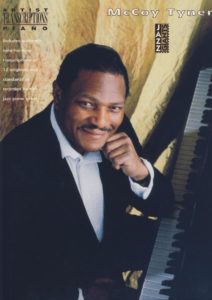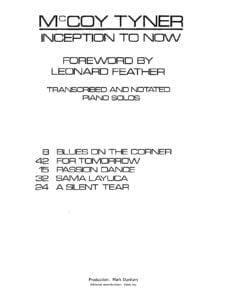Come join us now, and enjoy playing your beloved music and browse through great scores of every level and styles!
Can’t find the songbook you’re looking for? Please, email us at: sheetmusiclibrarypdf@gmail.com We’d like to help you!
Table of Contents
McCoy Tyner (sheet music in the #smlpdf)

Best Sheet Music download from our Library.

McCoy Tyner – There Is No Greater Love Full Score
McCoy Tyner Blues on the corner
McCoy Tyner Jazz Improvisation
McCoy Tyner Just Knock On My Door
McCoy Tyner Plays Standards Transcriptions, including:
1.Satin Doll Nights Of Ballads & Blues
2.Round Midnight
3.Blue Monk
4.Days Of Wine and Roses
5.Caravan Plays Ellington
6.When Sunny Gets Blue Today And Tomorrow
7.Soul Eyes Coltrane
8.Autumn Leaves Revelations
9.Someone To Watch Over Me
McCoy Tyner Pursuance
McCoy Tyner Transcriptions Inception to now, including:
B BLUES ON THE CORNER
42 FOR TOMORROW
15 PASSION DANCE
32 SAMA LAYUCA
24 A SILENT TEAR
McCoy Tyner Jazz Giants Artist Transcriptions, including:
Fly with the Wind · Folks · For Tomorrow · High Priest · Island Birdie · Just in Time · La Habana Sol · Man from Tanganyika · Prelude to a Kiss · Señor Carlos · Theme for Nana · You Stepped Out of a Dream.

Please, subscribe to our Library.
If you are already a subscriber, please, check our NEW SCORES’ page every month for new sheet music. THANK YOU!
McCoy Tyner Live at Newport ’63
Track Listing:
A1 Newport Romp 00:00 A2 My Funny Valentine 07:46 A3 All Of You 15:53 B1 Monk’s Blues 22:23 B2 Woody’n You 29:23
Personnel:
Piano – McCoy Tyner Trumpet – Clark Terry (tracks: A1, A2, B2) Alto Saxophone – Charlie Mariano (tracks: A1, A2, B2) Bass – Bob Cranshaw Drums – Mickey Roker
Recorded at New Port Jazz Festival, Newport, Rhode Island, July5, 1963

Please, subscribe to our Library.
If you are already a subscriber, please, check our NEW SCORES’ page every month for new sheet music. THANK YOU!

Best Sheet Music download from our Library.
Review by Chris May at All About Jazz: “Languishing off-catalogue for many years, McCoy Tyner’s Extensions may be the pianist’s most unjustly neglected album. Strange days, for not only is the music ineffably vibrant, but Extensions is the only recording ever to feature Tyner alongside pianist and harpist Alice Coltrane, who replaced him in saxophonist John Coltrane’s group in 1966. The album has one foot in the echoes of John Coltrane’s “classic quartet,” of which Tyner was a member from 1960-65, and the other in the astral jazz style which Alice Coltrane and saxophonist Pharoah Sanders fashioned in the late 1960s and early 1970s.
After quitting John Coltrane, Tyner moved to Blue Note Records, before signing with Milestone in 1972, where he became a major draw through the decade and into the early 1980s. Extensions was the sixth of seven LPs he made for Blue Note between 1967 and 1970. These include the acclaimed The Real McCoy (1967), one the last albums to be produced by the label’s founder, Alfred Lion, before ill-health led to his retirement, and Time For Tyner (1968), and also Asante (1970), another relatively uncelebrated work, which has pronounced stylistic links with Extensions.
The lineup for Extensions included The Real McCoy’s drum and bass team of Elvin Jones and Ron Carter, but replaced tenor saxophonist Joe Henderson with Wayne Shorter, on tenor and soprano, and Gary Bartz, on alto. Alice Coltrane is featured on harp on three of Extensions’ four tracks: “Message From The Nile,” “Survival Blues” and “His Blessings.” The first of these has a playing time of 12:21 minutes, the second 13:15, and they are the joint cornerstones of the disc, respectively opening side one and side two of the original LP. Extensions looks ahead to the global-cultural inclusiveness of Tyner’s work for Milestone in the mid and late 1970s, itself an important part of the astral jazz aesthetic.
But although the album includes some of that style’s signature elements, it does not wholly embrace it. The reasons were likely as much philosophical as musical. As a devout Muslim, Tyner would have had little time for astral jazz’s pantheism, and presumably even less for the psychedelics used by some of its practitioners. But he had long been drawn to African music, another astral signature, telling interviewer Frank Kofsky in 1966 that Africa was where he looked for inspiration (see Kofsky’s Black Nationalism and the Revolution in Music, Pathfinder Press, 1970).
With Elvin Jones in the band, Tyner, like John Coltrane before him, had a direct line to African music’s rhythmic legacy, and with Alice Coltrane, he had one of astral jazz’s most influential artists on board too.”
